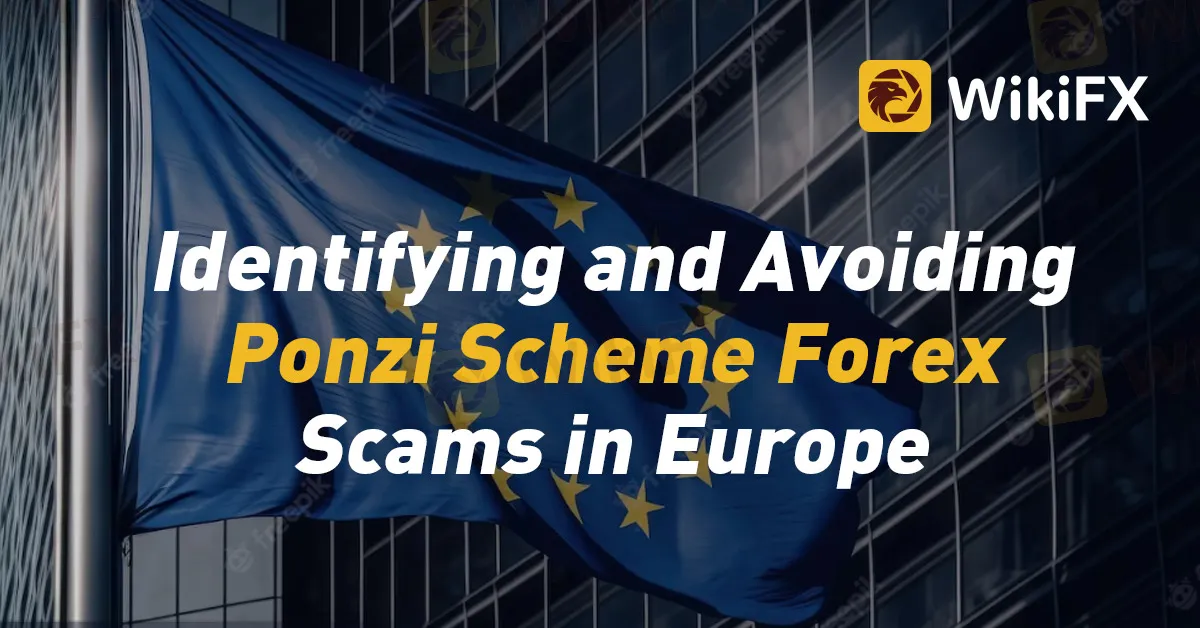简体中文
繁體中文
English
Pусский
日本語
ภาษาไทย
Tiếng Việt
Bahasa Indonesia
Español
हिन्दी
Filippiiniläinen
Français
Deutsch
Português
Türkçe
한국어
العربية
Identifying and Avoiding Ponzi Scheme Forex Scams in Europe
Abstract:Ponzi schemes have been a persistent problem in the financial industry, and forex markets are not exempt from their reach. These scams promise unrealistically high returns, often through forex trading, but instead rely on new investors' funds to pay off older investors. In this article, we will discuss how to identify and avoid Ponzi scheme forex scams in Europe.

Ponzi schemes have been a persistent problem in the financial industry, and forex markets are not exempt from their reach. These scams promise unrealistically high returns, often through forex trading, but instead rely on new investors' funds to pay off older investors. In this article, we will discuss how to identify and avoid Ponzi scheme forex scams in Europe.
Unrealistic Promises
Ponzi schemes lure victims with promises of extraordinary returns on investments. Be cautious of any scheme that guarantees high, consistent profits with little to no risk. Remember, if it sounds too good to be true, it probably is.
Lack of Transparency
Ponzi schemes often lack transparency when it comes to sharing information about their trading strategies or the specifics of their investments. Legitimate forex trading firms provide transparent information about their strategies and investments, while Ponzi schemes rely on secrecy and vague explanations.
Pressure to Recruit
Ponzi schemes typically encourage participants to recruit others to join the scheme. This is done to sustain the flow of new investments, as the funds from new recruits are used to pay off older investors. If a scheme emphasizes recruitment over actual trading, it's likely a Ponzi scheme.
Verified Track Record
Legitimate forex firms can provide verifiable records of their trading history, demonstrating consistent returns over time. In contrast, Ponzi schemes often fail to provide audited records or any evidence of their trading activities. Request proof of trading performance before investing.
Conclusion
Protecting yourself from Ponzi scheme forex scams in Europe requires vigilance and skepticism. Avoid schemes that promise unrealistic returns, lack transparency, or emphasize recruitment over trading. If you suspect a scheme may be a Ponzi scheme, report it to the appropriate authorities immediately. For more information on forex scams and reliable resources, visit WikiFX at www.wikifx.com. They offer valuable insights and tools to help traders make informed decisions and avoid falling victim to fraudulent schemes.

Disclaimer:
The views in this article only represent the author's personal views, and do not constitute investment advice on this platform. This platform does not guarantee the accuracy, completeness and timeliness of the information in the article, and will not be liable for any loss caused by the use of or reliance on the information in the article.
Read more

Alleged Concerns with TradeEU.global's Trading Practices
An individual trader has come forward with allegations of an unfavourable experience while using the services of the broker TradeEU.global.

Lured by False Promises: Malaysian Driver Lost RM218K to an Investment Scam
A 49-year-old e-hailing driver in Malaysia fell victim to a fraudulent investment scheme, losing RM218,000 in a matter of weeks. The scheme, which falsely promised returns of 3 to 5 per cent within just three days, left the individual financially devastated.

SFC Freezes $91M in Client Accounts Amid Fraud Probe
SFC freezes $91M in client accounts at IBHK, SBI, Monmonkey, and Soochow over suspected hacking and market manipulation during unauthorized online trades.

Malaysian Man Loses RM113,000 in Foreign Currency Investment Scam
A 57-year-old Malaysian man recently fell victim to a fraudulent foreign currency investment scheme, losing RM113,000 in the process. The case was reported to the Commercial Crime Investigation Division in Batu Pahat, which is now investigating the incident.
WikiFX Broker
Latest News
What Makes Cross-Border Payments Easier Than Ever?
Trader Exposes Unethical Practices by STP Trading
Saxo & Portuguese Bank Partnership
SEC Fines Broker-Dealers $275K for Incomplete SAR Filings
Lured by False Promises: Malaysian Driver Lost RM218K to an Investment Scam
FTX Sets March 2025 Timeline for Creditor Payouts: What It Means for Investors
What is an Economic Calendar? How it works
Italian Regulator Warns Against 5 Websites
SFC Freezes $91M in Client Accounts Amid Fraud Probe
Bybit Launches Gold & FX Treasure Hunt with Real Gold Rewards
Currency Calculator


